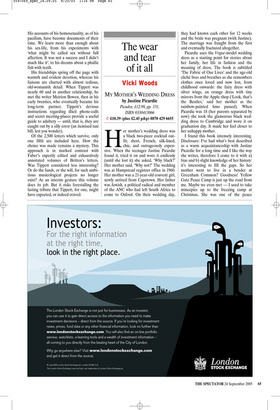A reputation still in the balance
Fiona Maddocks
SELECTED LETTERS OF MICHAEL TIPPETT edited and transcribed by Thomas Schuttenhelm Faber, £25, pp. 443, ISBN 0571226000 ✆ £20 (plus £2.45 p&p) 0870 429 6655 Perverse though it may sound, Tippett’s centenary has come upon us too soon. He died in 1998, aged 93, his passing marked with due pomp and affection as befits a Grand Old Eccentric whose tall, preternaturally boyish form hovered for so long over 20th-century musical life. Yet seven years on we are still unsure how to assess his wildly uneven output, now cranky and amorphous, now impassioned, dreamlike and, at times, sublime. Will his reputation grow or wither? The centenary year has made the picture no clearer.
If the recent Vaughan Williams revival is anything to go by, it takes an average of half a century for a composer of mixed reputation and long life to gain artistic rehabilitation. It wasn’t the case with Tippett’s prickly friend, rival and some time correspondent, Benjamin Britten, who died young enough (aged 63), and long enough ago (1976), to have romped to instant immortality. His case is straightforward, his genius, even among detractors, never in doubt.
Tippett remains problematic. The Ritual Dances are small masterpieces. The Fantasia Concertante on a Theme of Corelli, boosted by use, long ago, as the soundtrack for the film Akenfield, remains popular. His operas, to his own libretti, are full of magnificent music but can still seem rooted in an R. D. Laingian, groovy-baby psycho-muddle which the passage of time may merely render quaint.
Tacitly comparing himself with Britten, his junior by eight years, Tippett recognised himself as a struggler. ‘It will be another 2 years before completion,’ he whinged to Edward Sackville-West in 1948, about his first opera, The Midsummer Marriage. ‘I have not the genius to toss works off like some of my colleagues. I must needs plod.’ Meanwhile the unstoppable Britten had ‘tossed off’ Peter Grimes, Rape of Lucretia, Albert Herring and The Beggar’s Opera.
Some uneasy outpourings to Britten prove the most valuable fare in this haphazard but intriguing volume of letters. The constant pull of friendship and artistic endeavour makes for tense reading. ‘Dearest Ben,’ Tippett wrote in 1955, ‘... for better or worse, we two are the most interesting music has at the moment.’ A year later Tippett boldly describes his new Second Symphony as ‘one of the best pieces of music I shall have managed’.
After that work’s disastrous première, his tone shifts. Britten has offered substantial criticism to which Tippett replies stiffly, ‘My dear Ben, it was nice to hear from you just how the old Symphony [No.2] struck you .... I have a notion you’re right in that [movements] nos. 3 and 4 are less good absolutely than nos. 1 and 2.’ Hardly surprisingly, Tippett often expressed to others his irritation about Britten, referring to him as ‘the curly cherub’. ‘I saw Gloriana. It is another thin opera,’ he whines to his publisher at Schott. By 1954 ‘B.B.’ has cut him dead twice and is ‘äusserst empfindlich’ (extremely touchy). Yet Britten dedicated his chamber opera, Curlew River, to Tippett on his 60th birthday. What final falling out, if indeed there was one, brought their correspondence to an end more than ten years before Britten’s death?
We are not told. Such an omission is, alas, typical of this book. There’s a sense of haste which leaves frustrations. Footnotes are sketchy and erratic. The decision to group according to recipient makes any grasp on chronology elusive. A good communicator, Tippett is not a natural writer, with no ear for anecdote or eye for human foible. His chief preoccupation is himself. His accounts of his homosexuality, as of his pacifism, have become documents of their time. We learn more than enough about his sex-life, from his experiments with ‘what might be called sex without full affection. It was not a success and I didn’t much like it’, to his dreams about a phallic fish with teeth.
His friendships spring off the page with warmth and evident devotion, whereas his liaisons are charted with almost tedious, old-womanish detail. When Tippett was nearly 60 and in another relationship, he met the writer Meirion Bowen, then in his early twenties, who eventually became his long-term partner. Tippett’s devious instructions regarding illicit phone-calls and secret meeting-places provide a useful guide to adultery — until, that is, they are caught out by a silly error (an itemised taxi bill, lest you wonder).
Of the 2,500 letters which survive, only one fifth are included here. How the choice was made remains a mystery. This approach is in marked contrast with Faber’s expertly edited and exhaustively annotated volumes of Britten’s letters. Was Tippett considered less interesting? Or do the funds, or the will, for such ambitious musicological projects no longer exist? As an interim gesture this volume does its job. But it risks forestalling the lasting tribute that Tippett, for one, might have expected, or indeed craved.

































































 Previous page
Previous page